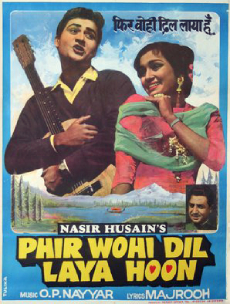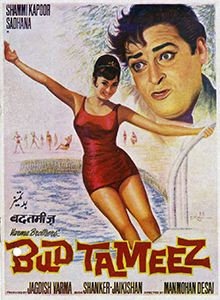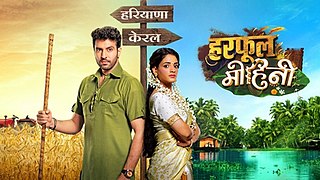Chitragupt Shrivastava, better known as Chitragupt, was an Indian film music director in Hindi cinema and Bhojpuri cinema.

Shashikala Saigal, better known by her first name, was an Indian film and television actress, who played supporting roles in hundreds of Bollywood films beginning in the 1940s.

Phir Wohi Dil Laya Hoon is a 1963 Indian Hindi-language film. The film became superhit at the box office. This was Nasir Hussain's second production, after the hit film Jab Pyar Kisi Se Hota Hai (1961). He also wrote and directed it. It starred Joy Mukherjee and the Nasir Hussain fixture Asha Parekh. Pran played the villain in the film and Rajindernath had a supporting role. It also contains many songs that Mohammed Rafi sang beautifully.

Mera Qasoor Kya Hai is a 1964 Indian Hindi-language film starring Dharmendra, Nanda and Om Prakash. The film's music is by Chitragupta.

Ganga Ki Lahren is a 1964 Hindi drama film produced and directed by Devi Sharma. The film stars Kishore Kumar, Dharmendra, Savitri, Aruna Irani, Rehman and Asit Sen. The music of the film is by Chitragupt, with lyrics by Majrooh Sultanpuri, featuring songs like "Ganga Ki Lahren".

Gharana (Family) is a 1961 Indian Hindi film that stars Raaj Kumar, Rajendra Kumar and Asha Parekh. It is directed by S. S. Vasan. The film became a box office hit. The film was a remake of the 1960 Telugu film Shanthi Nivasam and remade in 1988 as Ghar Ghar Ki Kahani.

Akashdeep is a 1965 Hindi film directed by Phani Majumdar. The film stars Dharmendra, Mehmood, Ashok Kumar, Nanda and Nimmi. The film's music was composed by Chitragupta in notable songs like "Dil Ka Diya Jala Ke Gaya", sung by Lata Mangeshkar.

Budtameez is a 1966 Bollywood film produced by Jagdish Varma and directed by Manmohan Desai. It stars Shammi Kapoor, Sadhana in lead roles, along with Brahm Bhardwaj, Laxmi Chhaya, Jagdish Raj, Kanan Kaushal, Purnima, Sunder, Kamal Mehra in supporting roles. Varma Brothers and Filmistan were the production companies for Budtameez, with Varma Brothers handling the Indian distribution and Filmistan controlling the release for in the rest of the world.

Aap Ke Saath is a 1986 Hindi-language film produced and directed by J. Om Prakash, starring Anil Kapoor, Vinod Mehra, Smita Patil, Rati Agnihotri, Utpal Dutt, and Amrish Puri.
Ganga Maiyya Tohe Piyari Chadhaibo is a Bhojpuri film released in 1963 directed by Kundan Kumar. It was the first-ever Bhojpuri film, and starred Kumkum, Ashim Kumar and Nazir Hussain. It had music by Chitragupta, lyrics by Shailendra and songs sung by Lata Mangeshkar and Mohammad Rafi. The film is based on author Acharya Shivpujan Sahay's short story Kahani Ka Plot.

Main Chup Rahungi is a 1962 Indian Hindi-language film directed by A. Bhimsingh and produced by A.V. Meiyappan. The film stars Meena Kumari and Sunil Dutt in lead roles. The film was a remake of 1960 Tamil film Kalathur Kannamma.

Janwar (transl. Animal), is a 1965 Hindi film directed by Bhappi Sonie. It stars Shammi Kapoor, Rajshree in lead roles. The music is composed by Shankar-Jaikishan and lyrics are by Hasrat Jaipuri, Shailendra and Faiz Ahmad Faiz.

Zabardast is a 1985 Indian Hindi action film directed by Nasir Hussain, with his nephew Aamir Khan as assistant director, and produced by Mushir-Riaz. The film stars Sanjeev Kumar, Sunny Deol, Jaya Prada, Rajiv Kapoor, Rati Agnihotri and Amrish Puri. This was Hussain's final film as a director. He originally conceived the project with an entirely different cast in 1979 but scrapped it and started from scratch. It still flopped at the box office.
Khalifa is a 1976 Hindi film, produced by Jeetendra Luthra and directed by Prakash Mehra. The film stars Randhir Kapoor, Rekha, Pran, I. S. Johar, Madan Puri and Lalita Pawar.
Jhamela is a 1953 Hindi comedy thriller film produced and directed by Bhagwan, for his Bhagwan Art Productions. The film was a repeat formula Bhagwan had earlier used in his commercially successful film Albela (1951). Albela with its "rumba-samba beats" in the composition of music director C. Ramchandra's songs, its comedy, and melodramatic story, had turned out to be an "all-time hit". With music again composed by C. Ramachandra, and casting actress Geeta Bali, Bhagwan tried to recreate the magic of Albela with little success. The film was termed a "semi-hit" at the box-office. It starred Geeta Bali, Bhagwan, Shakuntala, Sunder, Anwar Hussain and Badri Prasad.
Ghar Dwaar is a 1985 Hindi family drama film starring Tanuja and Sachin Pilgaonkar in the lead roles. The film was remade in Telugu as Aadi Dampatulu, in Kannada as Maneye Manthralaya and in Tamil as Kudumbam Oru Kovil.

Harphoul Mohini is a Hindi language action romance neo noir family entertainer adventure horror supernatural thriller show based on a Haryanvi Jaat Boy and Malayali Girl produced by Cockcrow Entertainment and Shaika Films. It aired from 13 June 2022 to 8 December 2022 on Colors TV, starring Shagun Sharma and Zebby Singh.












